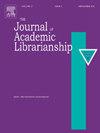Unlocking ancient wisdom with modern tools: A new approach to the revitalization of ancient texts based on generative artificial intelligence
IF 2.3
3区 管理学
Q2 INFORMATION SCIENCE & LIBRARY SCIENCE
引用次数: 0
Abstract
In the fields of library science and information science, the gap between the obscure language of ancient texts and the cognitive abilities of the average reader is the primary obstacle to the widespread dissemination of the rich wisdom in traditional cultural heritage. The rapid development of generative artificial intelligence technology has provided the conditions for researchers to transition from sequential organization of bibliographic references to the deconstruction and reorganization of knowledge elements. This study, reveals the intrinsic relationship patterns between multi-granularity knowledge in ancient texts from perspectives such as logical relationships, frame semantic associations, hierarchical structures, and feature associations, and constructs a multidimensional knowledge representation model for ancient texts. Furthermore, a YAML prompt template was designed by integrating large language models with the deconstruction of multi-granularity knowledge elements from ancient texts, and experiments were conducted using the Chinese classic “Records of the Grand Historian: Biographies.” The results indicate that the method developed in this study for the deconstruction and reorganization of knowledge elements in ancient texts exhibits notable characteristics such as multi-granularity, cross-document application, refinement, multiple perspectives, efficiency improvement, and scalability, demonstrating potential for application in the field of knowledge services for ancient texts.
用现代工具解锁古代智慧:基于生成式人工智能的古代文本复兴新途径
在图书馆学和信息科学领域,古籍晦涩难懂的语言与普通读者认知能力之间的差距,是传统文化遗产中丰富智慧得以广泛传播的主要障碍。人工智能生成技术的飞速发展,为研究者从书目参考文献的顺序组织过渡到知识要素的解构重组提供了条件。本研究从逻辑关系、框架语义关联、层次结构、特征关联等角度揭示了古籍中多粒度知识之间的内在关系模式,构建了古籍多维知识表示模型。此外,通过整合大语言模型与古籍多粒度知识要素解构,设计了YAML提示模板,并利用中国经典《史记-列传》进行了实验。结果表明,本研究开发的古籍知识要素解构与重组方法具有多粒度、跨文献应用、精细化、多角度、效率提升、可扩展性等显著特点,在古籍知识服务领域具有应用潜力。
本文章由计算机程序翻译,如有差异,请以英文原文为准。
求助全文
约1分钟内获得全文
求助全文
来源期刊

Journal of Academic Librarianship
INFORMATION SCIENCE & LIBRARY SCIENCE-
CiteScore
5.30
自引率
15.40%
发文量
120
审稿时长
29 days
期刊介绍:
The Journal of Academic Librarianship, an international and refereed journal, publishes articles that focus on problems and issues germane to college and university libraries. JAL provides a forum for authors to present research findings and, where applicable, their practical applications and significance; analyze policies, practices, issues, and trends; speculate about the future of academic librarianship; present analytical bibliographic essays and philosophical treatises. JAL also brings to the attention of its readers information about hundreds of new and recently published books in library and information science, management, scholarly communication, and higher education. JAL, in addition, covers management and discipline-based software and information policy developments.
 求助内容:
求助内容: 应助结果提醒方式:
应助结果提醒方式:


